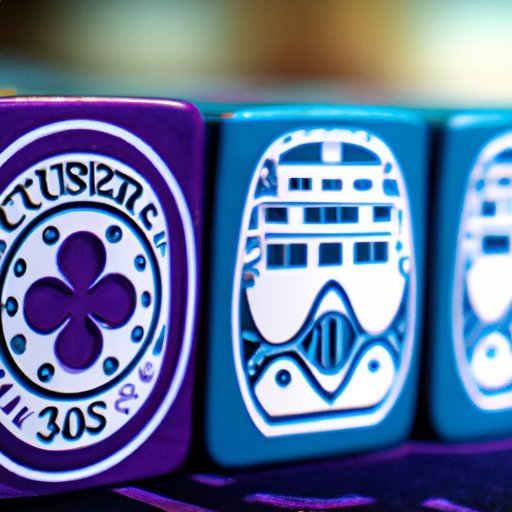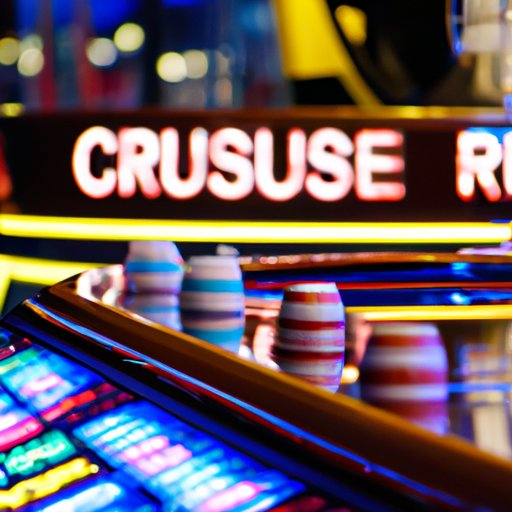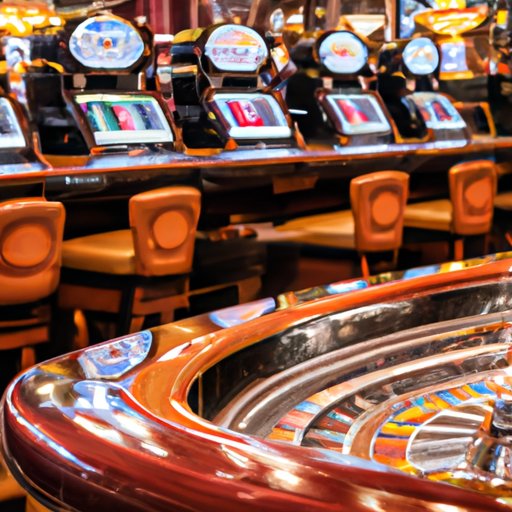Introduction
Cruise ship casinos are a popular attraction for many passengers, offering a chance to try their luck at various games while sailing the high seas. However, it’s important to understand that these casinos are subject to different regulations than land-based establishments. And as with any gambling activity, it’s important to gamble responsibly and understand the rules and regulations in place to protect both the players and the cruise lines.
In this article, we’ll explore the regulations governing cruise ship casinos, including the different governing bodies involved and the specific rules and regulations that must be followed onboard. We’ll also delve into the technology used to monitor casino activity and the measures cruise lines take to ensure responsible gambling. By the end of this article, you’ll have a better understanding of how cruise ship casinos are regulated and how to ensure a safe and responsible gambling experience onboard.

Exploring the Regulation of Cruise Ship Casinos: What You Need to Know Before You Gamble at Sea
Unlike land-based establishments, cruise ship casinos are subject to a complex web of regulation that involves multiple governing bodies. At the heart of this regulation are two key entities: the flag state and the port state.
The flag state is the country where the cruise ship is registered and is responsible for overseeing the ship’s compliance with relevant regulations, including those related to gambling. The port state, on the other hand, is the country where the ship is currently docked and is responsible for enforcing local laws and regulations, including those related to gambling.
Along with these two entities, cruise ship casinos are subject to oversight from a variety of other regulatory bodies, including the International Maritime Organization (IMO), the United States Coast Guard (USCG), and various national and state-level gambling commissions. Together, these entities work to ensure that cruise ship casinos adhere to a complex set of rules and regulations designed to protect passengers and maintain the integrity of the games.
Despite this intricate system of regulation, it’s important to remember that each cruise line may have its own specific rules and regulations in place. Before gambling onboard, it’s important to research the specific policies and procedures in place for the cruise line you’ll be sailing with.
Casino at Sea: Understanding the Rules and Regulations of Cruise Ship Casinos
So, what are the specific rules and regulations that must be followed onboard a cruise ship casino? Let’s take a closer look.
First and foremost, it’s important to understand that the types of games offered onboard may vary depending on the cruise line and the ship. However, most cruise ship casinos offer a range of popular games, including slot machines, blackjack, roulette, and poker.
When it comes to age restrictions, most cruise lines require passengers to be at least 18 years old to gamble onboard. However, some cruise lines may have a higher age requirement, such as 21 years old.
It’s also worth noting that unlike land-based establishments, winnings from cruise ship casinos are typically paid out in cash. However, the specific procedures for collecting winnings may vary depending on the amount won and the cruise line’s policies.
Perhaps most importantly, it’s crucial to gamble responsibly onboard a cruise ship casino. This means setting a budget before you start playing, avoiding chasing losses, and knowing when to walk away. Each cruise line may have its own resources available to help passengers gamble responsibly, such as self-exclusion programs and information on problem gambling.
Behind the Scenes: A Look at How Cruise Ship Casinos are Regulated
While passengers may only see the surface-level rules and regulations of cruise ship casinos, there’s actually a complex system of monitoring and oversight happening behind the scenes.
For example, many cruise ship casinos use advanced technology to monitor gameplay in real-time. This technology can track things like the amount of money being spent, the types of games being played, and the outcome of each round. This information can then be used to identify potential problem gamblers or instances of fraud.
In addition to these technological measures, cruise lines must also adhere to a variety of reporting requirements and audits. These can include financial audits, background checks on staff, and investigations into any complaints or incidents that occur onboard the casino.
If a cruise line is found to be non-compliant with any of the relevant regulations, they may face fines or other penalties. This ensures that cruise lines are held accountable for maintaining a safe and fair gambling environment for their passengers.

Navigating the Waters: A Guide to Cruise Ship Casino Regulations and Best Practices
While the regulations governing cruise ship casinos may seem complex, there are a few key rules and best practices that all passengers should keep in mind before gambling onboard.
First and foremost, it’s important to set a gambling budget before you start playing and stick to it. This can help you avoid overspending or chasing losses. It’s also a good idea to read the fine print before playing any games, as there may be specific rules or restrictions in place that you need to be aware of.
Additionally, it’s important to gamble responsibly and seek help if you’re struggling with problem gambling. Most cruise lines have resources available onboard to assist passengers who are experiencing issues related to gambling addiction.
Are Cruise Ship Casinos Safe? A Deep Dive into Industry Standards and Government Oversight
One common question many passengers have before hitting the casino onboard a cruise ship is whether or not these establishments are safe.
Thankfully, cruise ship casinos are held to the same high standards as land-based establishments when it comes to safety and fairness. In order to maintain their licensing and comply with relevant regulations, cruise lines must take steps to ensure the safety of their passengers and the integrity of the games being offered.
Still, it’s important to remember that gambling always carries some inherent risk. By gambling responsibly and following the rules and regulations in place, passengers can help ensure a safe and enjoyable experience onboard a cruise ship casino.

Playing Fair: How Cruise Lines Ensure Responsible Gaming in their Onboard Casinos
Finally, it’s worth noting that the cruise industry as a whole is committed to promoting responsible gambling and combatting problem gambling. This includes offering resources and support to passengers who may be struggling with addiction or other gambling-related issues.
Many cruise lines have implemented self-exclusion programs, which allow passengers to voluntarily ban themselves from the onboard casino. Additionally, some lines offer educational resources on responsible gambling, including information on how to spot potential warning signs of problem gambling and steps to take if you’re concerned about your own gambling habits.
The cruise industry also partners with broader initiatives aimed at combating problem gambling, such as the National Council on Problem Gambling (NCPG) and Gamblers Anonymous.
Conclusion
Cruise ship casinos can be a fun and exciting way to pass the time onboard a cruise. However, it’s crucial to understand the rules and regulations in place before you gamble at sea. By researching the specific policies and procedures in place for your cruise line, setting a gambling budget, and gambling responsibly, you can help ensure a safe and enjoyable experience onboard a cruise ship casino.
Remember, each cruise line may have its own specific rules and regulations in place. Familiarize yourself with these before you start playing, and don’t hesitate to seek help if you’re struggling with problem gambling.
